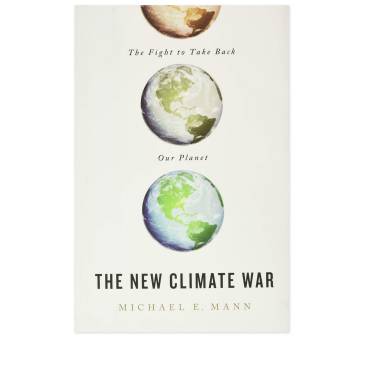«I Call Them Inactivists»
An interview with Michael E. Mann, by Christopher Schrader
The climate scientist Michael Mann talking about the new tricks and deception strategies currently being used by the fossil fuel industry.
Blatant lying doesn’t work anymore. So the friends and beneficiaries of coal, oil, and natural gas have developed a new strategy. They depict individual behavior as the key to the success or failure of climate protection, thus deflecting attention from their own actions and obfuscating political solutions to the crisis. Michael E. Mann analyzes how it all works in his latest book, «The New Climate War».
The climate scientist from Pennsylvania has been following the activities of opponents to effective climate protection for decades. And he has no choice. For he has been on the hit list, so to speak, of climate change deniers and fossil fuel lobbyists for over 20 years, ever since he and two colleagues produced the first reconstruction of the last thousand years of mean global temperatures. After remaining relatively unremarkable, temperatures began increasing dramatically with the onset of the Industrial Revolution. The resulting curve quickly came to be known as the «hockey stick graph», on account of the resemblance of its abrupt, steep incline to the shape of a hockey stick.
When the graph figured prominently in the third report of the Intergovernmental Panel on Climate Change (2001), Mann became a target. On account of his work, as well as emails that were hacked in 2009 from an English university and made public, his opponents have been trying – ultimately in vain – to show that he has manipulated data in an attempt to destroy his credibility. The geophysicist has even received death threats. Many commissions have cleared him of the charge of scientific misconduct. And his «hockey stick graph» has been confirmed by countless subsequent studies.
Michael Mann has written several books. His latest describes the fight against companies that have long known about the climate crisis but nevertheless want to keep profiting from fossil fuels. In an interview with Energiewende-Magazin, Mann explains why it is a trap to focus exclusively on individual behavior in the fight against climate change.
Mr. Mann, you seem to have a predilection for words beginning with D. One of your earlier books, «The Madhouse Effect», talks about climate change «denial» in all its forms. Then you explored the «discrediting» of scientists, which you yourself have experienced. In your new book you focus on at least five new D-words.
Yes, that’s right. I talk about «downplaying», «delay», «deflection», «division», and «despair-mongering».
Too bad that none of them starts with D in German.
Well, there’s Dummheit. That seems somehow appropriate.
That’s true. Tell us about these D-words.
My book is about a change of strategy on the part of the societal forces that continue to use fossil fuels and that above all want to sell them to us. I call them «inactivists». They have moved away from outright denying climate change because it’s just not credible anymore. We can all see that climate change is happening. Just look at what happened in Texas recently and other devastating impacts of unprecedented extreme weather events. It can’t be denied, so instead the inactivists have turned to a whole new set of tactics. Because ultimately they don’t really care about why we remain addicted to fossil fuels – just as long as we remain addicted to them.
What strategies exactly do the inactivists use?
They continue to downplay the problem and try to delay the needed transition. In addition, they attempt to place the greatest responsibility for overcoming the climate crisis on individual action. That serves to deflect attention away from the needed systemic solutions and to divide the environmental movement. And then there’s the tactic of convincing us that it’s too late, that there’s no hope of confronting the problem. Despair and doomism can put us on the same path of inaction as bald denial. Because every year that we continue to get our energy primarily from fossil fuels, the inactivists make billions of dollars in profits.
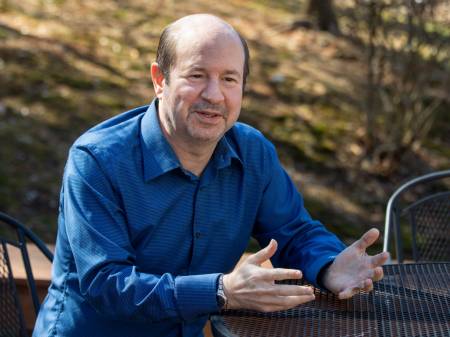
Let’s look at a few of the methods more closely. How does deflection work?
The inactivists place the blame for the climate crisis on individuals. They say, «You’re the one who wants to buy all these products. You aren’t willing to make the necessary sacrifices». This keeps us focused on our carbon footprint rather than theirs. You know, it was an oil company that actually really pushed the idea of the individual carbon footprint calculator. British Petroleum developed and promoted it in the early 2000s.
Before that, there was the environmental footprint, which was measured in the actual amount of natural resources consumed.
BP’s carbon footprint measures the production of greenhouse gases as the equivalent of tons of CO2. The idea was to give the company a new image and redefine the initials BP, to move away from «British Petroleum» and become «Beyond Petroleum».
Is there evidence that the fossil fuel industry’s deflection technique has been successful?
It’s hard to say how well it’s working because it’s a campaign that is still being developed and is still unfolding, but I would say it has worked amazingly. If you read the New York Times – that’s probably the most important newspaper for liberals and progressives in the United States – it has generally advocated concerted action on climate issues. And yet much of the focus in the articles they run is about things that individuals can do: changing your diet, not going on as many vacations, buying an electric vehicle. Much of their messaging when it comes to climate solutions is focused on these individual behavioral changes, almost to the exclusion of a discussion about the larger systemic changes that we need.
But you can’t accuse the New York Times of lobbying for oil companies.
No, but it shows how successful the campaign to deflect responsibility has already been.
Is there an antagonism between changes to individual behavior and systemic changes on the level of laws, regulations, and standards?
No, there isn’t. They complement each other and are both necessary. We should all think about how we can change our behavior and then implement those changes. All these things that decrease our environmental footprint, our carbon footprint, also save us money and make us healthier. They make us feel better about ourselves. They set a good example for other people. And I try to do my part. We have a power plan where we get our energy entirely from wind. We have a plug-in hybrid vehicle. I don’t eat meat because my daughter doesn’t eat meat.
Now you’re the one making the case for changing individual behavior.
Because it’s important! But we can’t allow this to be framed exclusively as the solution, to the exclusion of the needed systemic changes.
Is there really a danger of that?
The social science research on this point is somewhat ambiguous. On the one hand, if you start doing little things it leads you on a path to greater engagement. You start doing more and ask, «What else can I do?» On the other hand, an inordinate emphasis on individual behavior can crowd out the emotional energy for larger systemic changes. If we feel like we’re already doing a lot to deal with the climate crisis by changing our behavior and then we’re told we also have to pay a carbon tax, we may wonder if that’s really fair. So we have to be careful, because we need both: individual action and new legislation. We have to make sure to frame these as complementary rather than mutually exclusive.
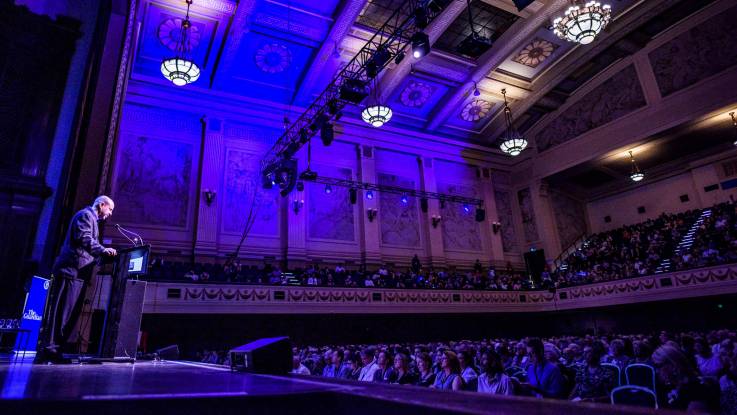
But don’t people develop an innate sense of fairness? It would make sense to think, «I’m doing my part, now industry has to do its part». Why doesn’t it work that way?
I’m not a psychologist. But what happens is that the response can depend very much on the way the question is worded, the way it is framed. What meaning do we ascribe to a specific behavior or demand by the way we phrase it? Industry understands that very well. They do their focus groups. They do their polling. They know that overly focusing our attention on individual action can lead to less support for the systemic political change that they don’t want to see implemented.
Is deflection a new strategy on the part of industry?
No, it’s a proven strategy that’s been around for decades. When I was growing up, there was a famous advertisement in the U.S. called the «crying Indian ad». We wouldn’t call it that anymore today. Now we’d refer to it as the crying «Native American». It turns out the actor was actually an Italian American, but that was the least part of the subterfuge.
In Germany there are famous films about an Apache chief named Winnetou, who was played by a French actor. But where is the subterfuge you’re talking about in the advertisement?
It exploited the zeitgeist of 1970s America, which had great reverence for the culture of the Native Americans. The ad shows a Native American with a feather in his hair canoeing down a river. There are plastic bottles and other litter in the water. Eventually he comes to the riverside and gets out of the canoe. Right then someone in a passing car throws a bag of trash out the window that lands at his feet and explodes. The camera zooms in on a single tear running down his face, as we hear a voiceover: «People start pollution. People can stop it.»
That sounds very powerful and effective.
Oh yes, many young people like myself felt empowered by it. It was a sort of awakening to the importance of personally and privately doing something for the environment. But we’d all been had. It was a very clever PR strategy that had been hatched on Madison Avenue by advertising executives working for Coca-Cola and the beverage industry. They didn’t want to see bottle bills, that is legislation that would put a deposit on containers. It would have been a systemic, a regulatory solution to the problem, but it would have hurt their profits.
And did it work?
Yes, it was very successful. It convinced many people we didn’t need regulation, that it was just about you and me being better stewards of the environment! Bottle bills only ended up being passed in 13 of the 50 states. There’s no national bottle bill, and there’s no chance of one becoming law. And now fossil fuel is using this old, tried-and-true playbook. The deflection campaign steers us away from systemic change and policy and regulation and puts all the responsibility for the climate crisis on individuals.
If I’ve understood your book correctly, the deflection strategy also has added benefits for the fossil fuel industry.
Absolutely. Putting the focus on individual responsibility causes conflict and division. Industry benefits when it can get climate advocates fighting with each other, finger pointing, behavior shaming. It turns into a divisive internal fight about individual behavior and carbon purity. These conflicts are encouraged online by trolls and bots. It’s the old divide-and-conquer strategy.
Flying on airplanes and eating meat then becomes a kind of purity test. Are people who still engage in that behavior even taken seriously anymore in the climate scene?
The inactivists seek to feed precisely those kinds of doubts. For example, Fox News and the right-wing media portray Al Gore and Leonardo DiCaprio as hypocrites. The idea is to discredit them as messengers for change.
Are they hypocrites?
No, not at all! Neither of them says you have to decrease your own carbon footprint by becoming a vegan or flying less. They fight very effectively within the framework of their own lives to encourage change and impact public opinion. When DiCaprio gave his Academy Award acceptance speech, which focused almost exclusively on climate change, there was more activity on Twitter related to climate change than at any other time in history.
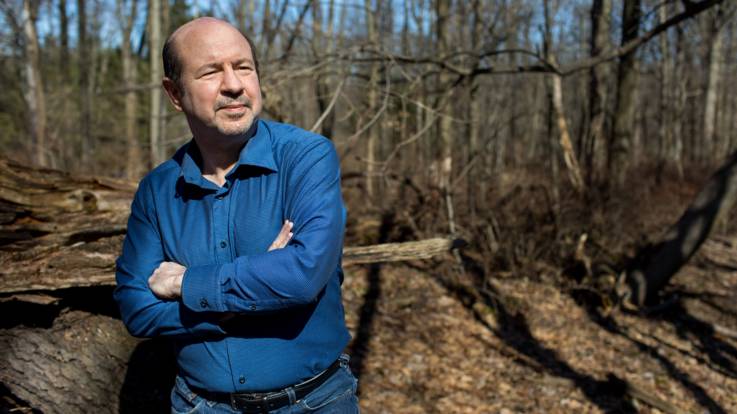
So is individual behavior unimportant after all?
No, but things get conflated. You could say there’s a hidden premise to the debate. Virtuous behavior is implicitly turned into a precondition for being allowed to say anything at all in the fight against the climate crisis. Sometimes it becomes the whole issue, and that’s precisely because we’ve lost sight of the major problems in the system that have to be changed. If you ask people what they can do to fight climate change, they tend to say they should become vegetarians rather than vote accordingly in the next election or demand that politicians take action.
Is this also a double bind for people like you, who talk about the climate crisis from the scientific perspective and urge political action? I mean, you told me up front how you’ve changed your own behavior without my even asking you.
Definitely. If I didn’t make an effort to walk the walk and not just talk the talk, it would be used against me. In fact, it has been used against me. I’ve been attacked by climate change deniers who actually used Google Earth to zoom in on my home. To show that I didn’t have solar panels. It wasn’t even the right home, but it’s true. We’re in a house that’s somewhat forested, and we don’t get a lot of sunlight on our roof. That’s why we chose the wind power plan. I’ve also been attacked by vegan activists and animal rights advocates for saying that personal, individual action alone isn’t the solution, that it isn’t going to get us where we need to go. They accuse me of saying that just so I can keep eating steaks. I have tell them that I don’t even eat meat, and that I’m saying this because I really do think it’s divisive and leads us down the wrong path.
So you have to prove your purity or irreproachability before people will listen to you?
Many people seem to feel that’s necessary, but then they scare their audience off when they list the radical changes they’ve made in their own lives. Maybe that is the double bind you were referring to. But I think for the most part it gets instrumentalized. In the vast majority of the interviews I do, the topic doesn’t come up. It’s good to send the right signals and to do what we can on an individual basis. We just can’t allow that to be used to deflect attention away from the real solution, which ultimately has to be systemic change.
What are the systemic solutions that you have in mind?
The idea is to create policy action that is invisible to us, that leads us in the right direction whether we realize it or not. Germany is leading the way in showing the world how such policies can work. For example, Germany puts a price on carbon…
… which is far too low…
… and has feed-in tariffs for renewable energy sources. That’s moving people collectively in the right direction. I’m hopeful that we’ll be seeing that over the next couple of years in the U.S.
So changes should first be made to the energy sector?
The energy system is the starting point. Making renewable energy cheaper and making fossil fuels more expensive sets what we call a price signal to stop damaging the environment. I strongly believe that people will make the right choice if it’s easier for them to do.
But many other reforms are focused on transportation, travel, consumerism, food, and industrial agriculture. And that ultimately puts the focus back on making individual lifestyle changes. What is the benefit?
It’s a dangerous road to make it sound like many people are going to have to make personal sacrifices. But we can work with incentives and compromises. We could make it cheaper, healthier, and easier for people to eat differently.
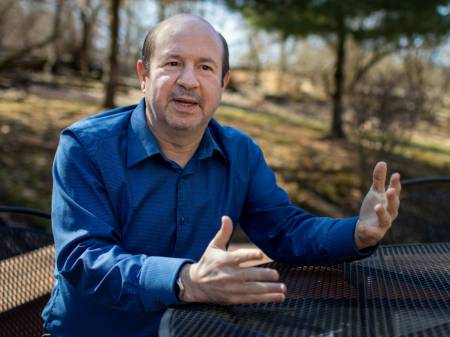
Still, the focus is back on individual behavior.
Other mechanisms are available. Let’s stick with the example of meat. We could change pasturing practices so that the animals help bury carbon in the ground when they walk around. And use feeds that cause cows to produce less methane. And we have to keep the scale in mind. If each of us has a steak once a year or a hamburger a couple times a year, that’s not going to break the bank. Beef is responsible for maybe three percent of our carbon emissions. If we decarbonize energy and transportation and at the same time engage in reforestation, then the Earth’s system can draw down enough carbon to keep up with livestock agriculture. We can’t let the perfect be the enemy of the good.
Presumably that also applies to the goals and policy options of the new American administration. How do you see the situation in your country? Are you afraid that fossil fuel interests will continue to have success with all the D-words?
The book went to press in August of 2020. We didn’t know where we would be at this point. I definitely thought we’d have a Democratic president again in Joe Biden. But now we have a Congress that is pretty much split. So it’s going to be difficult for us to see any sweeping «Green New Deal» legislation. But I think we can get some compromise climate legislation, like carbon pricing and incentives for renewable energy. And Biden realizes that since climate impacts every facet of our lives, climate policy needs to be incorporated into every single division of our government. That’s a new idea. Under Barack Obama, climate policy was typically siloed in the Environmental Protection Agency and the Department of Energy.
And internationally?
From day one, the Biden administration has telegraphed to the rest of the world that we’re back. These political changes coincide with a global youth climate movement, «Fridays for Future». Youth climate advocates have recentered this issue where it always should have been. It’s about ethics: the ethics of us not destroying this planet for future generations. And it’s precisely this task that politics and economics have to serve – regardless of the inactivists.
Michael E. Mann
Michael E. Mann was born in Amherst, Massachusetts in 1965. He is a geophysicist and a professor of atmospheric science and paleoclimatology at Penn State University. He runs the blog «RealClimate» along with various colleagues, and he is the author of five books about the climate crisis and the way facts and scientists are treated in his country.
His latest book, «The New Climate War: The Fight to Take Back Our Planet», was published by Public Affairs in January 2021.
-

Schuld ohne Sühne
Lediglich 20 Unternehmen verantworten 35 Prozent aller CO₂-Emissionen weltweit. Und dennoch ignorieren sie weiterhin alle Aufrufe zur Veränderung.
-
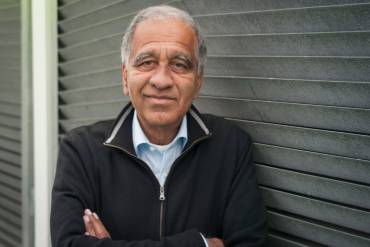
«Fakten dringen kaum noch durch»
Mojib Latif über Wissenschaft und soziale Medien, die Zuverlässigkeit von Klimamodellen und die bedrohte Vorreiterrolle Deutschlands beim Klimaschutz.
